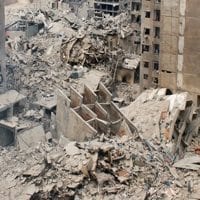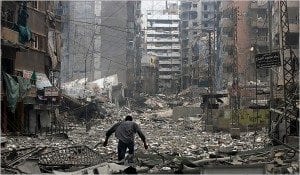 The recent meeting in Damascus gives us illumination into what this author sees as the coming fulfillment of Isaiah 17 the burden of Damascus. It is for this reason. Damascus is the head of many terrorist organizations. Israel’s past wars with Lebanon in 06 in which the Hizbulah 2006 Lebanon War – Wikipedia, the free encyclopedia claimed victory. This brazen policy of striking Israel with rockets into civilian Israel may employ the Dahiyah Doctrine (below) and totally destroy Damascus.
The recent meeting in Damascus gives us illumination into what this author sees as the coming fulfillment of Isaiah 17 the burden of Damascus. It is for this reason. Damascus is the head of many terrorist organizations. Israel’s past wars with Lebanon in 06 in which the Hizbulah 2006 Lebanon War – Wikipedia, the free encyclopedia claimed victory. This brazen policy of striking Israel with rockets into civilian Israel may employ the Dahiyah Doctrine (below) and totally destroy Damascus.
The IDF has developed and I think will use the Dahiyah Doctrine of overwhelming or disproportionate force against its antagonists in hope that excessive force will deter future terrorist acts. It won’t! I fear it will only stir the hornet’s nest and God will break Israel’s pride and military strength it trusts in now. God will also judge the nations that come against His land. God will do this not because Israel is good. No, He will do it for The sake of His Holy Name.
Therefore say unto the house of Israel, Thus saith the Lord GOD; I do not [this] for your sakes, O house of Israel, but for mine holy name’s sake, which ye have profaned among the heathen, whither ye went. And I will sanctify my great name, which was profaned among the heathen, which ye have profaned in the midst of them; and the heathen shall know that I [am] the LORD, saith the Lord GOD when I shall be sanctified in you before their eyes. Ezekiel 36:22-23.
Gog & Magog A Giant OBJECT Lesson
Soon God will make a giant object lesson with the battle of Gog & Magog. This appears to be on our horizon. Put your trust in the Yeshua Ha Misach.
Note Iran and many other rouge nations would love Israel to throw the first punch. After the destruction of Damascus in my sanctified speculation is the event that will catapult the battles of Psalm 83 and the greater conflict of Ezekiel 38 & 39 when God will make Himself to an unbelieving secular Israel.
 The Dahiyah Doctrine – Reut Institute
The Dahiyah Doctrine – Reut Institute
The Dahiyah Doctrine refers to an IDF military strategy developed in the aftermath of the Second Lebanon war that focuses on using disproportionate air power and artillery against a seemingly new type of fighting model of non-state terrorist and guerilla organizations.
Background
The Dahiyah Doctrine arose in the aftermath of the Second Lebanon War and the perceived failure of the IDF to utilize its military advantage against heavily armed non-state members of the Resistance Network (primarily Hizbullah and Hamas.)
The IDF’s traditional ‘use of force’ doctrine was perceived to have been unsuccessful in preventing rocket fire on Israeli civilian areas as well as resulting in IDF casualties.1
The Dahiyah Doctrine developed out of the realization that the IDF was fighting against a new type of enemy which required new tactics. In this context, the heavy bombardment inflicted on the South-Beirut Dahiyah neighborhood during the Second Lebanon war seen as a relevant model for fighting against non-state terror or guerilla organizations.
Doctrine Characteristics
According to the Doctrine, the targets against which the IDF should focus disproportionate force may vary between villages from which rockets are fired,2 the political, social or religious strongholds of the Resistance Network,3 or the civilian infrastructure of the political entity within which the Resistance Network operates.4
Moreover, the military response envisaged by the Dahiyah Doctrine marks a departure from previous military IDF strategy.
- Rather than use of firepower and quick maneuverability on the ground, the Doctrine adopts a strategy of massive firepower, primarily from the air.
- Rather than hunting down individual missile launchers, the Doctrine focuses on punitively destroying the entire area from which rockets are fired.
- Rather than seeking to achieve a decisive victory, the Doctrine focuses on deterring the enemy via considerations of cost-effectiveness and hopes the threat of massive economic and physical destruction to infrastructure will drive a wedge between members of the Resistance Network and the local population.
Sources
Interview with Gadi Eisennkot, YNET, 10/03/08.
Amos Harel, Ha’aretz, 10/05/2008
Trilateral meeting in Damascus
By JPOST.COM STAFF
26/02/2010 11:42 Note the date, but The Players are the SAME! As of 2018
 Ahmadinejad, Nasrallah and Assad have dinner together, discuss “threats.”
Ahmadinejad, Nasrallah and Assad have dinner together, discuss “threats.”
Trilateral meeting in Damascus
Iranian President Mahmoud Ahmadinejad and Hizbullah leader Sheikh Hassan Nasrallah met Thursday evening in Damascus along with their senior advisors, and discussed regional developments and “the zionist threat,” it was revealed Friday.
The two were the guests of Syrian President Bashar Assad, who had dinner with the two and participated in the talks.
According to Arab media reports, the meeting was not reported upon until after it had taken place for security reasons.
On Thursday Ahmadinejad and Assad together unleashed vicious rhetoric against Israel, with Ahmadinejad declaring that the “criminal” state of Israel is doomed, and Assad charging that Israel “is capable of aggression at any point.”
Visiting Damascus, Ahmadinejad vowed that Arab nations will usher in a new Middle East “without Zionists and without colonialists.”
In remarks that extended to vicious criticism of the US, and made a mockery of Washington’s efforts to engage his Syrian hosts, Ahmadinejad said the United States should leave the Middle East and stay out of regional affairs.
“[The Americans] want to dominate the region but they feel Iran and Syria are preventing that,” Ahmadinejad said during a news conference with Assad. “We tell them that instead of interfering in the region’s affairs, to pack their things and leave.”
He added that “if the Zionist regime wants to repeat its past mistakes, this will constitute its demise and annihilation.”
Assad, for his part, said Syria was “facing an entity that is capable of aggression at any point, and we are preparing ourselves for any Israeli aggression, be it on a large or small scale.”
He added that America should not dictate relationships in the Middle East.
“I find it strange how they talk about Middle East stability and at the same time talk about dividing two countries,” Assad told reporters when asked about US Secretary of State Hillary Rodham Clinton’s call Wednesday for Syria to move away from Iran.
Assad took a swipe at Clinton for making such a suggestion, saying he and Ahmadinejad “misunderstood, maybe because of translation error or limited understanding.” In a show of unity, the two signed an agreement canceling travel visas between their countries.
US State Department spokesman P.J. Crowley, speaking to reporters in Washington on Thursday, said Assad “need only look around the region and recognize that Syria is increasingly an outlier.”
“We want to see Syria play a more constructive role in the region and one step would be to make clear what Iran needs to do differently. And unfortunately, there was no evidence of that today,” he said.
President Shimon Peres slammed the meeting between Ahmadinejad and Assad, warning that Iran’s true designs were for “hegemony over the Arab world in the Middle East.”
“The time has come to tell the truth,” Peres said at a memorial service for Joseph Trumpledor in Tel Hai.
“The problem in the Middle East is not the Palestinian problem, which will be solved in a peace process with Israel. The central problem in the Middle East is Iran’s attempt to take control of the Arab Middle East, which is why it is building an atomic bomb, and why it is supporting and developing terror organizations like Hizbullah in Lebanon and Hamas in Gaza,” Peres said.
By Aaron Hecht
As I’m sitting here in Jerusalem writing this to you, Jews in Israel and around the world are preparing to celebrate the Festival of Purim.
This festival is not mandated by the Bible but it is at least theoretically based on the book of Esther, which is unique in being the only book of the Bible that does not mention God directly.
But it tells a story about the Jewish exile in Persia (the ancient name for Iran), and how a member of the Persian royal court tried to have the Jews wiped out. If you’ve never read the book of Esther, this weekend would be a good time to do it. It’s only a few chapters, you can read it in a half hour or less.
This year Purim is especially poignant in Israel because there is another man in Persia today who would like to wipe the Jews out, as he has made very clear on several occasions.
President Mahmoud Ahmadinejad is in Damascus right now, meeting with other leaders who would like to destroy Israel. There’s a story about it here in case your local newspaper isn’t reporting on it.
http://www.jpost.com/MiddleEast/Article.aspx?id=169748
But the message of Purim is bigger then a story about a guy long ago who tried to do something wicked and got what he deserved. It’s a story about how the genocidal hatred for the Jews and the People of God displayed by so many down through history is not just another example of irrational “racism” but is in fact a much bigger issue.
People who hate Israel and the Jews really hate God.
They hate the Bible, they hate the plan God has for the Human Race, which includes the Jews and Israel as integral and irreplaceable parts of that plan, and they hate the idea that they must submit to God’s authority and do things His way instead of their own way. The Jews remind them of all these things, and that’s why they hate them. For the same reason, they also hate the Church.
The ultimate source of this hatred is Lucifer the Devil, who, despite what you will hear from many sources, including many in the Jewish world and what calls itself the Christian Church, is a literally existent being who has been fighting against God and His Son Jesus Christ and their Plan for the Human Race since before Creation.
That is why, as big of a threat that Islam poses to Israel, the Jews and the Church, I believe that liberal secular humanism is at least as dangerous if not more so. They both come from the same spiritual source, and they share the same ultimate objective.
The book of Esther tells the story of the exile of the People of God in ancient Persia and a Satanic attempt to destroy them. It’s a good story for us to remember this Purim weekend because as citizens of the Kingdom of God and of His Christ, we are all “exiles” in this world, in it but not of it, as the Bible says. As we keep our eyes focused on Christ and our salvation/redemption through Him, it’s a very good time to remember the story of Esther and the fact that we’re still acting it out in the world today.
Lucifer is still walking to and fro throughout the Earth like a Lion, seeking what he might devour. We, the People of God, are still his favorite target.
So remember to cover yourself and those you love in prayer, read your Bible daily and meditate on it constantly, and lift each other up in prayer and supplication before the Lord on a daily basis.
Connect with Amos37
Stay up to date with Amos37.com eMail update (Weekly)
Free Resources for the growing Christian.
“But grow in grace, and [in] the knowledge of our Lord and Saviour Jesus Christ. To Him [be] glory both now and for ever. Amen.” 2 Peter 3:18
Blue Letter Bible Free Online Bible & Study Tools & Commentaries
Bible Classes College Level For Free to Enroll Track your progress.
Our Own Free Discipleship Course In Video HD.



















